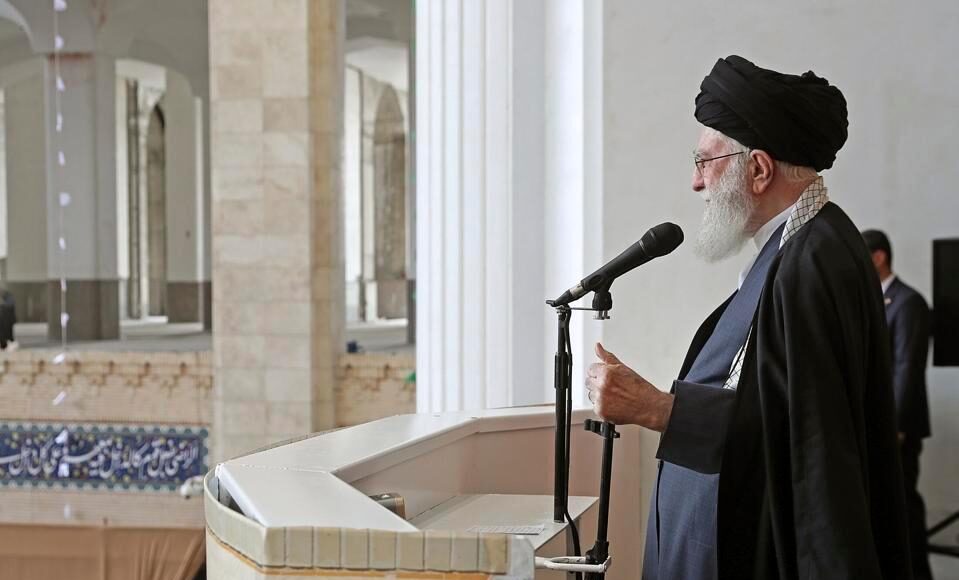The world is watching for Iran’s response to an April 1 airstrike on its embassy in Syria—which Iran has blamed on Israel—as U.S. officials have suggested a retaliatory attack is imminent, raising fears of a significant escalation of tensions in the Middle East amid the ongoing Israel-Hamas war.
U.S. officials for days have been signaling that an Iranian attack could be imminent—with President Joe Biden saying Friday he expects an attack “sooner than later,” and multiple reports have cited U.S. officials who believe an attack could be imminent, potentially as soon as this weekend.
Biden unexpectedly cut his weekend trip to Delaware short on Saturday, planning to return to the White House in the afternoon to consult his advisers on the growing tensions between Iran and Israel.
While nothing has been officially confirmed, multiple outlets this week cited U.S. officials who said a potential attack could include missiles and drone strikes aimed at military or government targets within Israel, and could be launched from within Iran by both Iran and its various proxy groups.
Iran has reportedly been seen moving military assets around internally, the outlets reported, though CNN reported it’s not immediately clear if Iran is readying an attack from within its borders, or if it’s readying for a response from Israel or the U.S.
On Friday, John Kirby, the communications director for the National Security Council, said the U.S. deemed the threat to be “real, to be viable, certainly credible” and said the U.S. is “watching it as closely as we can.”
Signs of tension could be seen around the world in recent days—the U.S. issued a travel warning cautioning citizens against visiting Israel Israel, while the United Kingdom and France also advised against travel to Israel.
Iranian forces Saturday morning seized a cargo ship reportedly linked to Israeli billionaire Eyal Ofer in the Strait of Hormuz, prompting a rebuke from the Israeli foreign minister.
Biden suggested Friday the U.S. is prepared to defend Israel in the event of an attack, claiming “we will support Israel, we will help defend Israel and Iran will not succeed”—potentially raising the stakes of any Iran-led offensive. Those comments, coupled with a report from the Wall Street Journal that the U.S. has moved warships to be ready to defend Israel, suggests the possibility the U.S. could be drawn into a military response if Iran acts. Iran has responded to the embassy strike—which Israel has not claimed responsibility for—with blustery rhetoric aimed at both Israel and, at times, the U.S. In a statement following the bombing, Iran’s U.N. ambassador Zahra Ershadi blasted the U.S. for its support of Israel and claimed “the United States is responsible for all crimes committed by the Israeli regime.” In a statement tweeted by Mohammad Jamshidi, deputy chief of staff for Iranian president Ebrahim Raisi, Iran warned the U.S. “not to get dragged in (Israeli Prime Minister Benjamin) Netanyahu’s trap for US: Stay away so you won’t get hurt.”
Some reports have suggested Iran is aiming to curb any wider conflict. Reuters reported Friday that Iranian sources said Tehran has signaled to Washington it hopes to avoid escalating the conflict. Axios reported Thursday Iranian Foreign Minister Hossein Amir-Abdollahian told a German official Iran is planning an “appropriate” but limited strike in hopes of avoiding escalation. One U.S. official told Axios Iran’s message to the U.S. has been “don’t f–k with us and we won’t f–k with you.” The U.S. has denied any involvement in the strike on the Iranian embassy.
An Iranian attack on Israel could significantly widen the crisis in the Middle East, causing significant spillover from the ongoing Israel-Hamas war in Gaza, which started after Hamas attacked Israel on Oct. 7, killing more than 1,200 and taking hundreds hostage. Israel has already vowed to retaliate against Iran if it carries through with the attack.
“Iran is less likely to retaliate using one of its proxies, simply because it won’t be seen as ‘up to snuff’ in terms of responding to the damage that Israel carried out on Iran’s diplomatic facility,” said Farzan Sabet, a senior research associate with the Geneva Graduate Institute’s Global Governance Center, in an interview with CNN. “I think some form of direct retaliation by Iran itself is in order, although that attack might be supplemented with attacks from its Axis of Resistance partners.”
The air strike on the facility in Syria reportedly killed two Iranian generals and five officers. While Iran has blamed Israel, and Israel has been widely linked to the attack, Israel itself has not claimed responsibility. Iran has long been vocally supportive of Hamas and critical of Israel’s actions in Gaza. It’s also materially supported other proxy groups that are Israel’s enemies, like the Houthis in Yemen, who have been attacking ships crossing the Red Sea in a show of support for Hamas. Hezbollah, another Israeli enemy, based in Lebanon, is supported by Iran.
Life in Israel has been largely carrying on as normal amid concern of a potential Iranian attack, according to a Saturday report by Bloomberg. Israel’s government has issued no special orders to its citizens, and citizens were seen out and about in Tel Aviv. “We’re not going to sit around and be afraid,” resident Rafael Gigi told Bloomberg.








